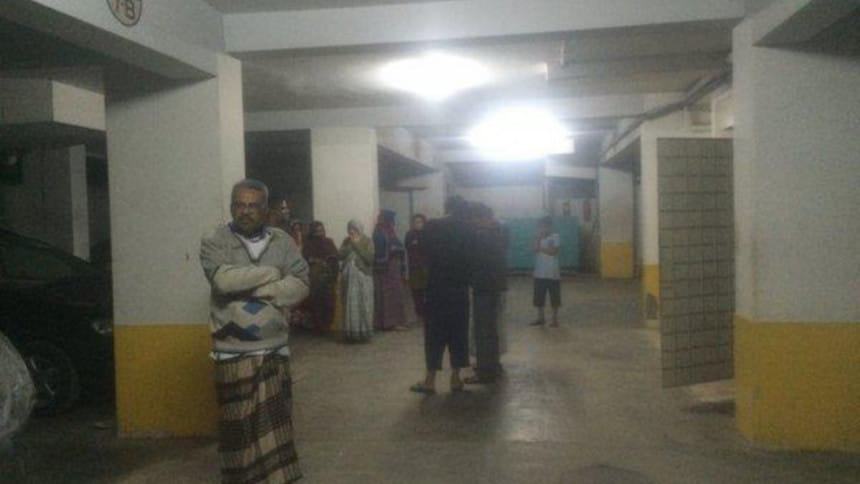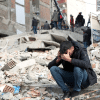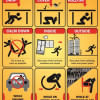Quakes that matter

There are many quakes that rock us on a daily basis. As a nation, we are hardly allowed to be at ease. Either it's an external critique of a project or a sector or a practice, or it's us, ourselves damming our own fortune.
As early as 5:07 in the morning, the latest quake shook us all up. I woke up thanking God for making the quake happen in the morning, way before any readymade garment worker hit their workplace. On second thoughts, my mind wandered through a gallery of pictures taken in Rayer Bazar where a few buildings that I had seen last April seemed ready to collapse. For a moment, I thought of the possible impact of the earthquake if it happened while I was at work on the 10th floor of a tall building. Had the earthquake happened during working hours, all of us would be busy trying to gauge how many factories had collapsed, how many workers had been killed or hurt in a stampede; had it happened during the working morning hours, most of us on higher floors of tall units would rush down the stairs, grabbing things that matter to us the most and keeping our fingers crossed. For a moment, I was fear struck thinking what the media coverage would do to most of us, with cameras crowding around our factory buildings, calculating how many cracks our floors had developed or up to how many degrees the building had tilted.
I shared with an architect friend of mine how lucky we were to have landed up with minimal damage. 30 hurt and 4 dead weren't numbers that we could not deal with. The fact is I regretted what I said the next moment. One death is far too many. Yes, the damage could have been much worse, and I thanked God for being kind. At this point, my friend flared up, "This is what's wrong with you all. People just keep on thanking God and depending on Him for what could be corrected by their own selves. You won't move for safety, you won't address any disaster management issues, just because God keeps on saving us." I agreed. God cannot be an alternative to action or an answer to inaction. If there are 70,000 buildings in Dhaka, which are truly at risk, should we just continue leaving everything up to Him, hoping that He will rescue us every time a magnitude of 6+ hits Monipur? I certainly hope not.
On a separate note, I can't blame our panic or fear. Just a few days ago, a report was published by a Foundation, which detailed workplace safety conditions, which indicated that the highest number of deaths had happened in readymade garment sector. Out of 971 deaths, in reality, 347 happened in informal sector (construction workers being the highest: 146) whereas in formal RMG, 73 deaths were reported out of which 47 had died while they were on their way to work or returning. Now, how does that number relate to workplace safety? I guess the report needed figures instead of facts and relied a lot on perception.
Fact is, we are all scared of damaging exposure. We are worried about every little or big sins we have committed only because of the public repercussion. Morality from within has ceased; the "others" determine our moral worth. Therefore, we lay vulnerable to external shocks of exposés instead of the voices we hear inside ourselves. And very often, we wake up to external quakes that breathe in the layers of our earth and surface once in a while… The history of this country has also been fraught with quakes of many kinds. The story has been an unending one. What was undisputed history once is now questioned; what is a given in democracy is being reinvented; what was an axiom once is today a hypothesis.
While I finish the piece, since I don't want to miss out on current political quakes, hungry for an update, on the latest on a "possible clash" between AL and BNP on the single matter of democracy, I surf the net and find reports of clashes in Sylhet, Gaibandha and 18 BGB platoons in Chittagong. Dhaka? Nothing so far… By practice, most of us have forgotten to hope and have resorted to fearful anticipation. Instead of cheering all the successes, we have practiced to look for the futile, examine democracy as an event instead of a process and have pinned all our fears on the negative reports of the next hour, just because wars have to continue for oppositions to survive.
Long ago, before Jeremy Bentham, the philosopher died in 1832 at the age of eighty-four, he demanded his corpse to be stuffed, so that he could be preserved and displayed for centuries to come. At the same time, he also wished that his friends and disciples should meet every year "for the purpose of commemorating the founder of the greatest happiness system of morals and legislation" and when his disciples actually met, they were asked to bring Bentham out for all occasion. In the 1980s when the International Bentham Society was founded, his admirers obliged. The "auto-icon" of Bentham was wheeled in. Bentham is reported to be brought out for most meetings of the governing council of University College London, whose minutes record him as "present but not voting." Unfortunately not all plans of Bentham worked well. His embalmed head suffered and has been replaced by a wax head. His actual head was displayed for some time on a plate between his feet, when his naughty students decided to steal it and ransomed it back to UCL for a generous donation. The story of the stuffed Bentham should work as a lesson for all political parties. Embalming does not help and occasional press meets and fiery rhetoric don't suffice. An ideology is only sustained if backed by popular will and never by force. Failure to secure political will can only result in failed and foiled demonstrations and clashes, which in turn, act as political quakes, setting our pace of progress back to a sub zero limit.
Good sense must prevail. Amen.
The writer is Managing Director of Mohammadi Group.

 For all latest news, follow The Daily Star's Google News channel.
For all latest news, follow The Daily Star's Google News channel. 








Comments